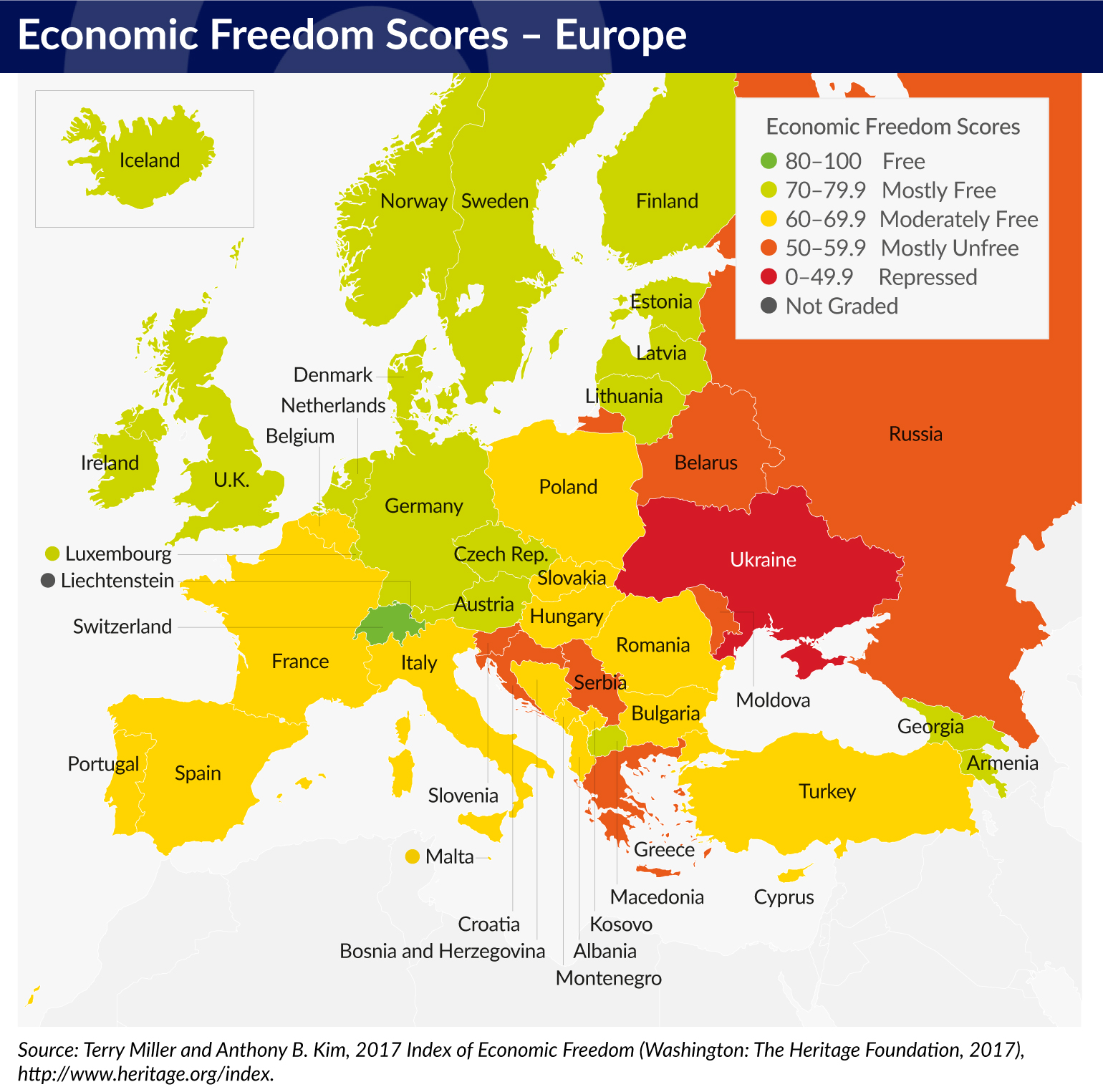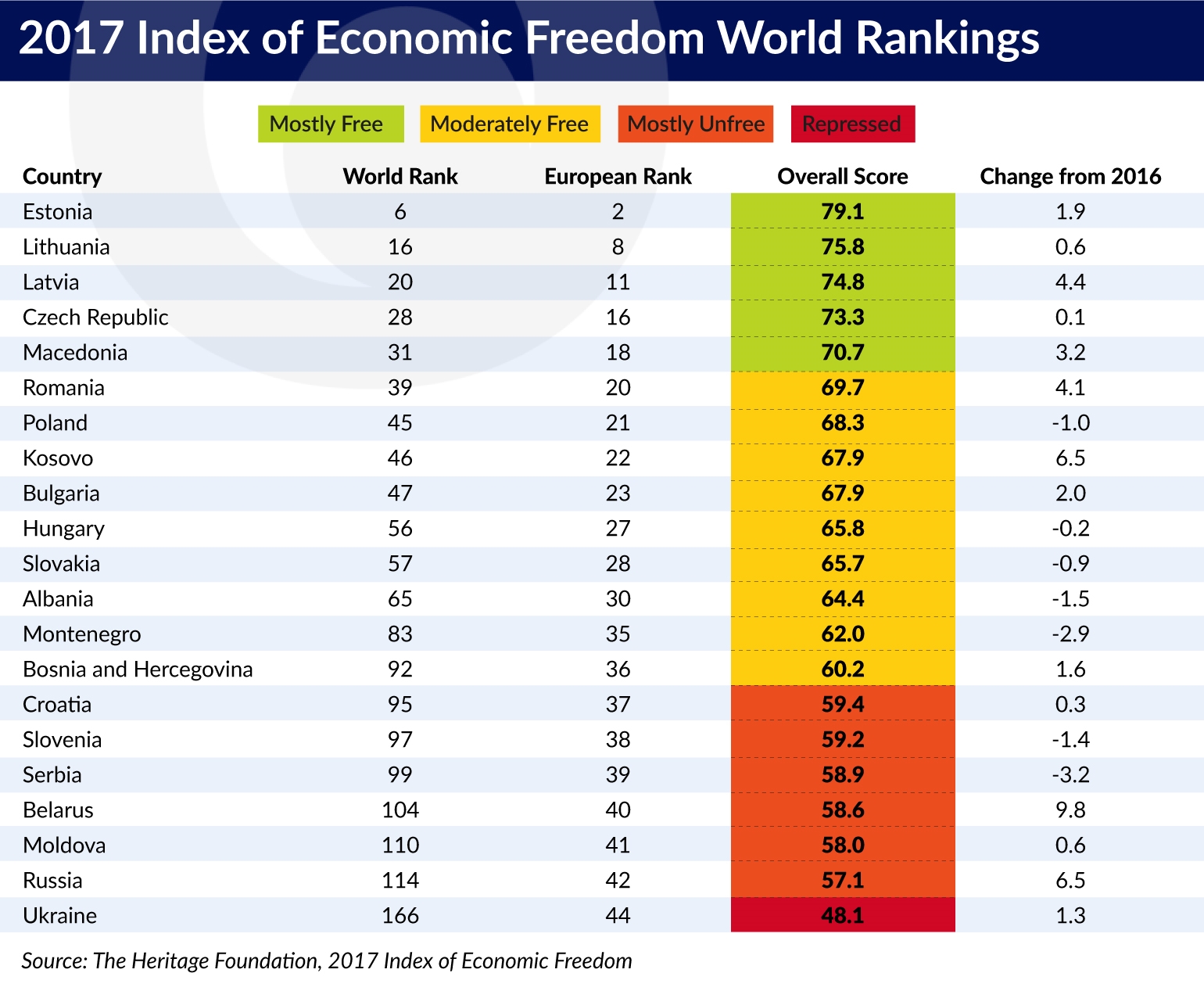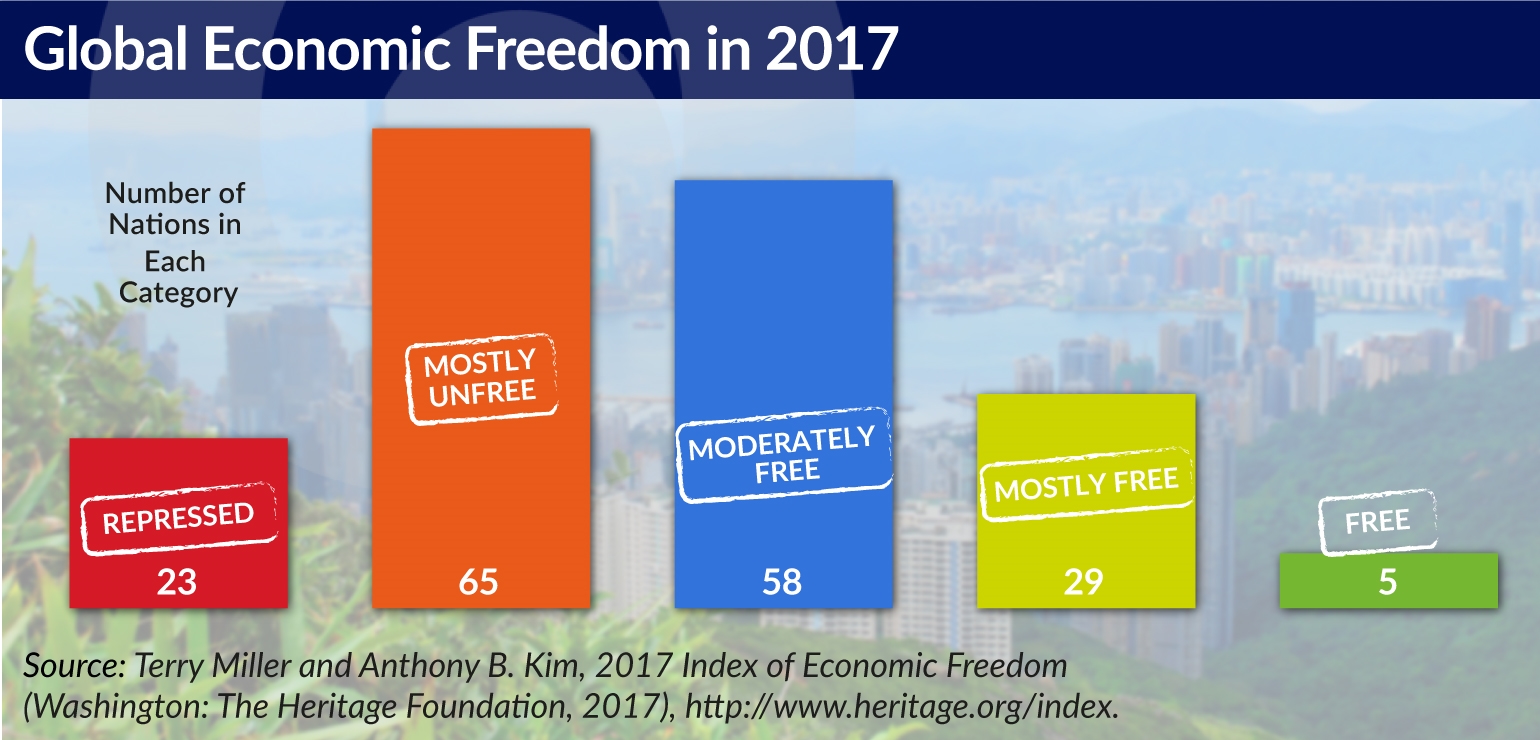The Index of Economic Freedom chronicles and benchmarks many factors underpinning economic freedom in countries throughout the world. The index ranks countries according to government economic policies that enhance economic freedom – or don’t.
„Successful countries are those that chart not just one path to development, but as many as the ingenuity of humans can produce when they are free to experiment and innovate,” the foundation notes.
Of the 186 countries included in the 2017 edition, 180 are fully scored and ranked. Because of insufficient data, six countries (Iraq, Libya, Somalia, Syria, Yemen, and Liechtenstein) were evaluated but not ranked. In the 2017 Index, Afghanistan was ranked for the first time, and Sudan returned to the rankings for the first time since 2000.
The 12 economic freedoms are grouped into four pillars:
- Rule of law (property rights, judicial effectiveness, and government integrity);
- Government size (tax burden, government spending, and fiscal health);
- Regulatory efficiency (business freedom, labor freedom, and monetary freedom);
- Market openness (trade freedom, investment freedom, and financial freedom).
Key Findings of the 2017 Index
Per capita incomes are much higher in countries that are more economically free. Economies rated “free” or “mostly free” in the 2017 Index generate incomes that are more than double the average levels in other countries and more than five times higher than the incomes of people living in countries with “repressed” economies.
Not only are higher levels of economic freedom associated with higher per capita incomes, but greater economic freedom is also strongly correlated to overall well-being, taking into account such factors as health, education, environment, innovation, societal progress, and democratic governance.
No matter what their existing level of development may be, countries can get an immediate boost in their economic growth by implementing steps to increase economic freedom through policies that reduce taxes, rationalize the regulatory environment, open the economy to greater competition, and fight corruption.
„Behind this record of advancing economic freedom are stories of human progress and the achievements of countries and their citizens—literally billions of people around the world whose lives have been measurably improved. There also are stories of policy failure, backsliding, and continuing repression,” according to the foundation’s Terry Miller and Anthony B. Kim.
Economic freedom has advanced in a majority of the world’s countries over the past year. Global average economic freedom increased by 0.2 point to a record level of 60.9 on the 0–100 scale used in the Index of Economic Freedom. Since the inception of the Index in 1995, average scores have increased by over 5 per cent.
Europe on the map
The authors of the report write that in the past Europe has served as the testing ground for the two great economic philosophies and has witnessed the collapse of one of them: Communism, which proved unable to generate standards of living even remotely approximating those of capitalist Western Europe. Now many of the large economies in Europe that were built on a quasi-market welfare state model are looking for ways to improve their competitiveness vis- à-vis fast-growing small economies like Ireland and Estonia that have surpassed them in economic efficiency.
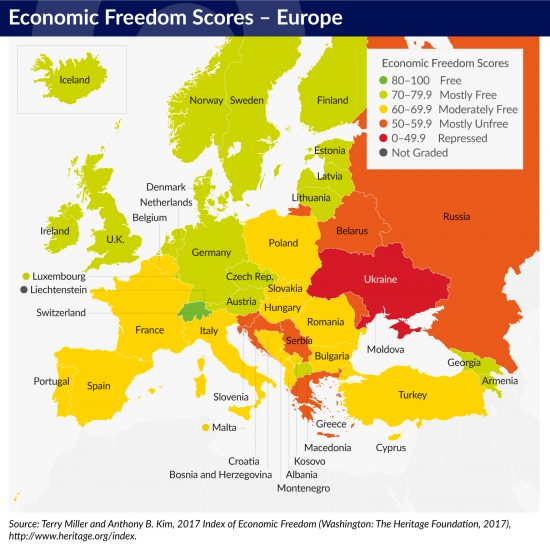
The European region encompasses nations as diverse as Russia, Switzerland, Iceland, and Greece. The population-weighted average GDP per capita for the region stands at USD31,661, with inflation generally under control. However, the European continent is plagued by higher unemployment rates than are historically typical and by a growing level of public debt. It is notable that 11 of the world’s 20 the freest countries are in Europe, which is the only region to have a distribution of economies that is skewed toward relatively high levels of economic freedom. Most countries in the region fall into the category of “mostly free” and “moderately free.” Seven countries (Croatia, Slovenia, Serbia, Belarus, Moldova, Russia, and Greece) have economies that are rated “mostly unfree”. Ukraine, which continues to experience political and security turmoil, remains the region’s least economically free economy.
The biggest gains in the CSE
Some of the countries from the CSE region gained a lot comparing to the 2016 ranking. Undoubtedly, the biggest jump was done by Belarus which escaped the status of economically “repressed”.
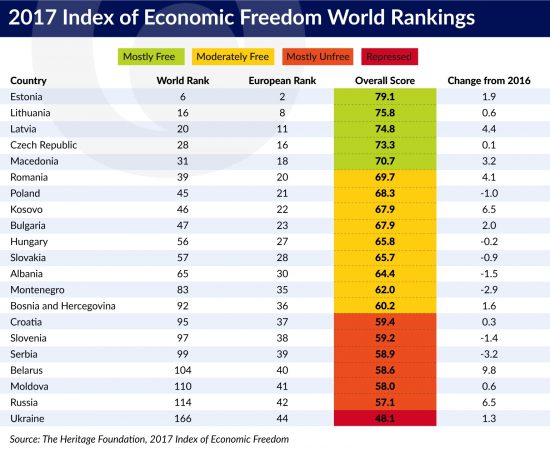
Authors of the report stress that Belarus has achieved minor success in deregulation, but also admit that more liberal economic policies have not been a priority for Belarusian government. The country is “mostly unfree” mainly because the state controlling 70 per cent of the economy, thus the private sector is small and marginalized. On top of that government interference with the private sector, monetary freedom, investment freedom, and financial freedom is far below average levels.
Surprisingly, also Russia improved by 6.5 points. Despite the fact that its economy is severely hampered by blatant disdain for the rule of law and for the concept of limited government, as the authors of report write. The private sector remains marginalized by structural and institutional constraints caused by ever-growing government encroachment into the marketplace. Large state-owned institutions have increased their domination of the financial sector at the expense of private domestic and foreign banks. The inefficient public sector dominates the economy. Russia is ranked as “mostly unfree” because the risk of state meddling in the private sector remains high in Russia’s repressive political environment. And the low price of oil, the financial burden of annexing Crimea, including the Western sanctions, and the desire to rearm the Russian military have strained public finances.
Latvia, Macedonia and Kosovo are among those countries that have more of the economic freedom than in 2016. Authors of the report stress that the increasing dynamism of Latvia’s economy has been facilitated by openness to global trade and investment. Supported by efficient business regulations that promote entrepreneurial activity, the overall commercial environment has become conducive to business creation and risk-taking.
In Macedonia improvements in regulatory framework have created a stable environment for foreign and domestic investment, but political instability has undercut vibrant growth. Although, according to the authors of the report, Macedonia depends primarily on economic activity in service sectors, new investment in automotive parts manufacturing is helping to diversify the economy.
Kosovo, despite operating in a challenging regional economic environment, has outperformed its neighbors and recorded economic expansion every year since gaining independence. The country has adopted a constitutional fiscal rule to keep public debt from rising to unsustainable levels and has implemented competitively low corporate tax rates. Kosovo is “mostly free” due to institutional and other structural shortcomings related to corruption and the rule of law which have put downward pressure on overall competitiveness and productivity growth, limiting the emergence of a more vibrant private sector.
CSE countries that still have to improve
Serbia is the biggest loser with 3.2 points less than it had in 2016. Although it has implemented significant structural reforms in some parts of its economy, overall economic freedom in Serbia continues to be constrained by the lack of political will to undertake the bold reforms that are required. Inefficient government spending remains high and poorly managed. Deeper institutional reforms are needed to tackle bureaucracy, reduce corruption, and strengthen a judicial system that is vulnerable to political interference. And the country has had difficulty balancing its EU aspirations with its historical ties to Russia (read more here).
Montenegro has lost 2.9 points. The trade regime is increasingly open, and the regulatory and legal frameworks governing investment and production have become more efficient, supporting the development of a growing private sector. The authors of the report write that other reforms, which included further reduction of the already competitive flat tax rates and implementation of labor market reforms, have also contributed to an upsurge in entrepreneurship. But Montenegro’s economic freedom is still curtailed by the lack of institutional commitment to the strong protection of property rights or effective measures against corruption. The court system remains vulnerable to political interference and inefficiency.
Some problems still exist in Slovenia, mainly the corruption. Although less prevalent than in many of Slovenia’s neighbors, is perceived as a widespread. It often takes the form of conflicts of interest involving contracts between government officials and private businesses.
Poland is among “mostly free” countries. The authors of the report praise Poland’s economy which has demonstrated a fairly high degree of macroeconomic resilience. Structural reforms that have included trade liberalization, implementation of a competitively low corporate tax rate, and modernization of the regulatory environment have facilitated the transition to a market-oriented economy. They also stress that the private sector now accounts for two-thirds of Poland’s GDP. But the ongoing concern is the fiscal consolidation and prudent management of public finance. Also the judiciary, which is independent, but is too slow and sometimes is a subject to political pressure.
Global Gains and Losses
In the 2017 Index, 103 countries, the majority of which are less developed or emerging economies, showed advances in economic freedom over the past year. Remarkably, 49 countries achieved their highest economic freedom scores ever. Two large economies (China and Russia) are included in this group, the report notes.
Two countries (Mauritius and the United Kingdom) recorded no change in score, 73 experienced declines in economic freedom, and 16 countries, including notably the Bahamas, Bahrain, El Salvador, Pakistan, Venezuela, and the United States, recorded their lowest economic freedom scores ever.
The Asia–Pacific region is home to nine of the 20 most improved countries: Fiji, Kiribati, Kazakhstan, China, Turkmenistan, Uzbekistan, Vanuatu, Tajikistan, and the Solomon Islands all recorded score gains of four points or more. On the other hand, Sub-Saharan Africa has the most countries (Cabo Verde, Djibouti, Ghana, Guinea, Kenya, The Gambia, and Madagascar) recording notable score declines, followed by the Americas (Barbados, the Bahamas, Venezuela, Suriname, Saint Lucia, and Brazil).
Of the 180 economies whose economic freedom has been graded and ranked in the 2017 Index, only five have sustained very high freedom scores of 80 or more, putting them in the ranks of the economically “free.” The five are Hong Kong, Singapore, New Zealand, Switzerland, and Australia. A further 29 countries, including Chile, the United Arab Emirates, the United Kingdom, Georgia, the United States, and Mauritius, have been rated as “mostly free” economies with scores between 70 and 80.
A total of 92 economies, or about 51 per cent of all nations and territories graded in the 2017 Index, have earned a designation of “moderately free” or better. These economies provide institutional environments in which individuals and private enterprises benefit from at least a moderate degree of economic freedom in the pursuit of greater competitiveness, growth, and prosperity. On the opposite side of the spectrum, nearly half of the countries graded in the Index—88 economies—have registered economic freedom scores below 60. Of those, 65 economies are considered “mostly unfree” (scores of 50–60), and 23 are considered “repressed” (scores below 50).
Despite the global progress recorded over the 23-year history of the Index, the authors of the report write, the number of people suffering from a lack of economic freedom remains disturbingly high: around 4.5 billion, or about 65 per cent of the world’s population,” the report notes. Over half of them live in just two countries, China and India, where advancement toward greater economic freedom has been both limited and uneven.
